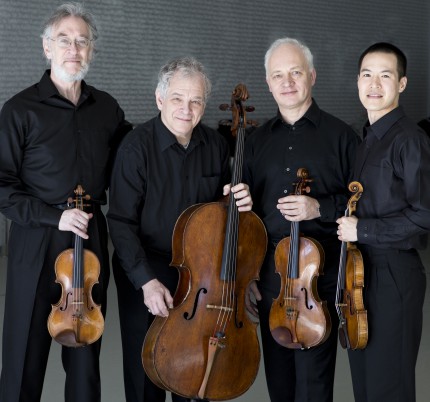Juilliard Quartet notches another bow passing at Ravinia
The venerable Juilliard Quartet has endured over a dozen personnel changes in its 70-year history, but the staggered replacement schedule has notably accelerated in the past five years. The most transformative of these was the appointment of first violinist Joseph Lin in 2011. Two years later Ravinia audiences witnessed the passing of the viola bow from Samuel Rhodes to Roger Tapping.
In an emotional farewell Monday at Ravinia’s Martin Theatre, Juilliard cellist Joel Krosnick made the last local appearance of his 42-year tenure, stepping aside for Astrid Schween, the 20-year veteran of the Lark Quartet. As a woman and an African-American, her appointment marks a sea change of diversity for a quartet that has been an all-male ensemble throughout its history.
Krosnick has been a titan of the cello world, not only as chamber musician par excellence and mentor to countless budding musicians at Juilliard (a position he will retain), but as an ardent champion of new music. He was the principal advocate of contemporary works within the quartet, and one can only hope that the newer members will continue to carry this torch.
That being said, his departure would have served the quartet’s musical interests had it come a few years earlier. His intonation has held up fairly well, and his sense of ensemble playing is as acute as ever. But as was evident in this substantial program, his sound has thinned and the vibrato is now marred by a distinct wobble. Since Lin and Tapping have brought a level of polish and elegance unheard of in earlier iterations of the quartet, these liabilities are all the more apparent.
While the audience was eager to hear the newcomer, she inexplicably appeared only as the second cellist in Schubert’s Quintet in C major. The first cello part is one of the glories of the literature, and Juilliard’s performance suffered from denying Schween that honor in her debut tour. With Krosnick’s tentative and underpowered upper register solos, and Schween’s deference as the subordinate in much of the score, the quintet had an oddly top heavy balance. Her playing was admirable as far as it could go in this context, but a full reckoning will have to wait until her full integration later this year.
If Schubert’s pioneering orchestration was difficult to fully appreciate under these compromised circumstances, the composer’s limitless trove of melodic treasures and intoxicating dramatic sweep still received strong advocacy. The foursome shifted gears subtly between sections in the first movement to underline character changes and to hold the massive structure in firm focus. Lin’s technical mastery and seductive tone have always been a marvel, but his playing now displays greater interpretive insight after a few years in the principal chair. The presence of the estimable veteran Ronald Copes as second violinist has no doubt spurred Lin’s growth.
Mozart’s Quartet in C Major, K. 465 (“Dissonant”) contains little to justify its nickname, though its famous Adagio introduction includes a healthy dose of rich chromaticism and harmonic misdirection. A crisis was barely averted when Krosnick plunged into his opening pedal point as his colleagues were waiting for the clamor of a Metra train to subside. Once past that near mishap, the quartet highlighted the opening disquietude before launching into a spirited reading of the Allegro proper. There was a marked contrast between Lin’s ease with quick passagework and Krosnick’s discomfort, but aside from a Menuetto that was too eager to foreshadow Beethoven’s more combative scherzos, it was an involved and coherent reading.
More than the veteran Kronos Quartet and the upstart JACK Quartet, Juilliard tends to champion composers with old-school academic credentials. Richard Wernick certainly fits that bill, and the ensemble made a convincing case for his new and gnarly Quartet No. 9, heard here in its Midwest premiere. The language is methodically atonal, and the first movement (“Assertive, Aggressive”) more than lives up to its bellicose moniker. The unrelieved and dense expressionism of Berg is the most obvious model, with tightly developed motivic interplay and individual lines that dart and weave in large leaps.
The title of the second movement (“per uno selva oscura”–“in a dark wood”) is derived from the opening of Dante’s Inferno, and depicts a traveler lost on life’s journey. There are brief memories of the first movement and a surge of optimism from the cello in the final bars, but most memorable were slowly rocking repeated notes stitched into the texture and passed between instruments like a burden to be shared. It’s an unusually fine example of a style of composition not currently in favor, and kudos to the quartet for helping bring it to life.
Posted in Performances





